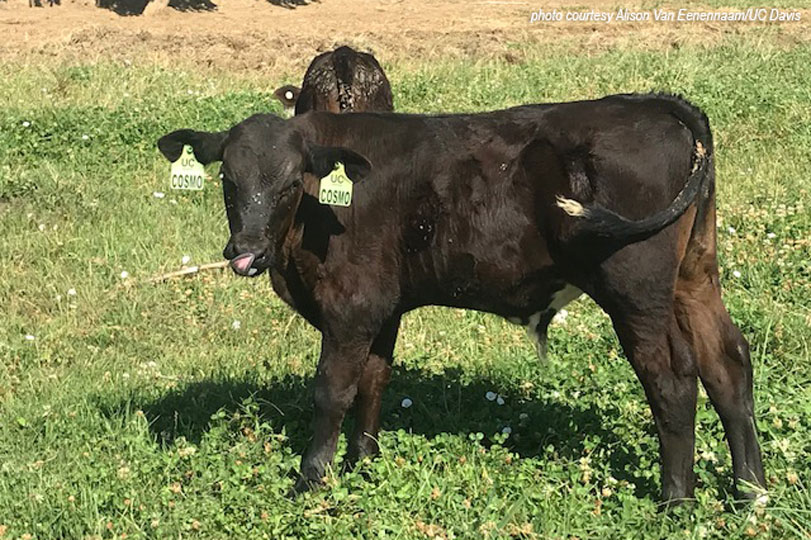By Jennifer Dorsett
Field Editor
Scientists at the University of California, Davis, have raised a bull calf that was genome-edited as an embryo to produce more male offspring.
Using the genome-editing technology CRISPR, researchers make precise cuts or insertions to the genome, allowing desirable traits to be created more quickly and reliably than previous methods.
Inserting genes is called a “gene knock-in.”
To produce the bull, which they named Cosmo, researchers knocked-in the cattle SRY gene, which is the gene responsible for initiating male development, into a bovine embryo.
“We anticipate Cosmo’s offspring that inherit this SRY gene will grow and look like males, regardless of whether they inherit a Y chromosome,” Alison Van Eenennaam, animal geneticist with the UC Davis Department of Animal Science, said.
She noted producing more males is desirable because male cattle are about 15 percent more efficient at converting feed into weight-gain than females. They also tend to be processed at heavier weights.
More male cattle may also help create additional sustainability in cattle herds as fewer cattle would be needed to produce the same amount of beef, fellow researcher Joey Owen said.
“Ranchers could produce some females as replacements and direct a higher proportion of male cattle to market,” Owen, a postdoctoral researcher who is working with Van Eeenennaam on the project, said.
The scientists made a breakthrough discovery when targeting bovine chromosome 17.
Previous attempts to knock-in the SRY gene on the X chromosome, which would have resulted in a bull producing solely male offspring, were unsuccessful. But chromosome 17 is a “genetic safe harbor site,” ensuring the expression or regulation of adjacent genes is not disrupted by the insertion.
Now, the bull is expected to produce 75 percent male offspring. Fifty percent will be normal XY animals and an additional 25 percent of XX animals will inherit the SRY gene.
“It took two-and-a-half years to develop the method to insert a gene into the developing embryo and another two years to successfully establish a pregnancy,” Owen said.
The scientists celebrated after a healthy 110-pound male calf was born this past April, but this is only the beginning of their research, Van Eenennaam said.
The bull will reach sexual maturity in about a year and will be bred to study whether inheriting the SRY gene on chromosome 17 will trigger male developmental pathways in XX embryos, resulting in offspring that grow like and appear as male.
She noted the U.S. Food and Drug Administration regulates gene-editing of animals, so these cattle will not enter the food supply chain.
Click here to read the research poster about the project and see more photos.

